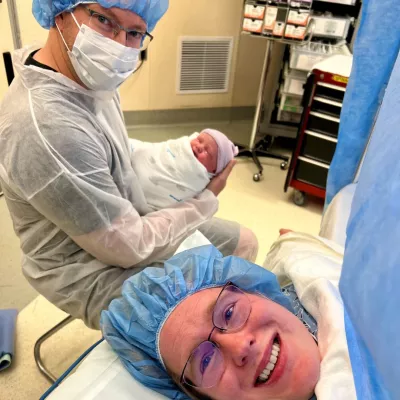- AdventHealth

Considering starting a family can be a very exciting time, but it comes with many important questions—including when, where and how to begin.
One of the most important things you can do is bring your OB/GYN into the discussion with you and your partner as early as possible to help guide you with a personalized and healthy family plan.
We’re here with our expert, Subhia Rehman, MD, AdventHealth Medical Group OB/GYN, at Celebration to walk you through the preconception planning process and how to prepare for a healthy pregnancy.
What Is Preconception Planning?
Preconception planning is prepregnancy counseling with your OB/GYN to review your health history, health status and pregnancy health goals to help keep you and your future baby as healthy and safe as possible.
"For any reproductive-age woman with the potential to get pregnant, any time is the perfect time to talk to your OB/GYN, especially if you want to get pregnant,” says Dr. Rehman.
Dr. Rehman adds, "OB/GYNs have a prime opportunity to improve fetal and maternal outcomes with preconception counseling for women before pregnancy."
Your Three-Month Preconception Plan
Dr. Rehman explains that preconception planning begins with getting a complete history of each woman, including her menstrual, medical, surgical and family histories — ideally at least three months before becoming pregnant.
“Based on your information and health history, we give our input about how to help optimize the health of the woman and your potential baby. We might suggest different interventions or treatments to help improve pregnancy outcomes or counsel how your genetic history or current health status could affect maternal and fetal health if you do get pregnant,” notes Dr. Rehman.
Assessing for Pregnancy Risk Factors
From the preconception assessment, Dr. Rehman explains that she can identify any risk factors that should be addressed before a woman gets pregnant. Lowering these risk factors before pregnancy could protect the health of mother and baby.
Keep reading to learn what Dr. Rehman says are important things to know before getting pregnant.
Reaching a Healthy Preconception Weight
Obesity is associated with significant chronic conditions, such as diabetes, polycystic ovarian syndrome (PCOS), hypertension (high blood pressure), thyroid disorders, kidney conditions and others that can negatively affect pregnancy outcomes. "If a woman has a BMI greater than 30, considering weight loss before getting pregnant is a good idea," explains Dr. Rehman.
She continues, "We work on optimizing these health conditions before pregnancy for the health and safety of both mom and baby. Treatment for these conditions may help regulate a woman's menstrual cycle, improving fertility.”
Preconception Visit Checklist
Some women or their families may have a history of genetic disorders. If this is the case, Dr. Rehman explains that they may choose to see a genetic counselor or do genetic testing before conceiving. "This can give a woman more information to inform her family planning. It can help predict the likelihood that her baby would have a genetic disorder, so she can make decisions that she is comfortable with," she says.
Preconception Medications and Supplements
Before trying to conceive, your OB/GYN will likely discuss any medications you are currently taking, including both prescription and nonprescription drugs. Dr. Rehman notes, "It's even important to talk about any herbal products or nutritional supplements because some have effects that can influence pregnancy outcomes.”
Sometimes, the prescription medications may need adjustments to optimize pregnancy outcomes. Medications can also include contraceptives. Your OB/GYN can advise you when to stop any birth control pills or other means of contraception and help you time your family planning for optimal success.
Smoking, Alcohol and Preconception Planning
“We know that women who smoke during pregnancy have a greater chance of having preterm delivery, premature rupture of the membranes and even lower birth weight babies. There are also adverse effects when it comes to alcohol — there’s no safe level of alcohol in pregnancy,” advises Dr. Rehman.
Alcohol exposure, especially in consistent and higher quantities, can cause what is called fetal alcohol syndrome, a condition of structural and developmental abnormalities in the baby. That’s why part of Dr. Rehman’s pregnancy counseling includes discussing healthy lifestyle changes.
Immunization Status and Infectious Diseases
Immunizations help protect the mother and baby during pregnancy, so this is a critical risk factor. Dr. Rehman says, "We check if women are up to date with their immunizations such as MMR, hepatitis B and varicella, for example, as well as screen for other infections like STIs that could affect the baby."
Preconception Diet and Nutrition
Nutrition plays a vital role in both maternal and fetal health. "We look at a woman's nutritional status to see if she is getting enough nutritional requirements, including taking enough folic acid supplementation, which should start with 400 micrograms of folic acid once a day at least three months before getting pregnant. All reproductive-age women should be on folic acid because supplementation reduces the risk of neural tube defects," recommends Dr. Rehman.
She also suggests correcting any major nutritional deficiencies before planning a pregnancy. This is especially important for women who may have a previous history of nutritional deficiencies and for women who have recently had weight loss surgery.
Preconception Exercise Plan
Regular physical exercise can boost your health lifelong. Still, before pregnancy, it can help reduce obesity, improve heart health, optimize other medical comorbidities and improve the management of other chronic diseases, all of which help promote the best possible outcome during pregnancy.
Cycle Regularity and Structural Abnormalities
One way that OB/GYNs like Dr. Rehman assess fertility is by understanding the regularity of a woman's monthly cycle.
“For a woman to get pregnant, she must be ovulating. If she isn’t (or it isn’t regular), we can look at the potential reasons why and address those so that her chances of getting pregnant are greater,” Dr. Rehman says.
She adds that some medical conditions can cause a woman's cycle to be irregular, such as thyroid conditions, PCOS and a wide variety of chronic conditions. There are also conditions like endometriosis, uterine fibroids or endometrial polyps that may influence the woman's chance of getting pregnant. Some conditions can be addressed with an OB/GYN, while others may need a referral to a specialist for assessment and care.
Social and Emotional Health
Starting a family is a big, life-changing step for any woman. So, assessing a woman's readiness in the social and emotional aspects of health is important.
“Part of my assessment is to talk openly with women about their support network and home environment to ensure that it is safe and secure for her and a potential baby. We have mental health and other community resources to help women who may need it,” says Dr. Rehman.
Pregnancy Spacing
If a woman is planning another pregnancy, OB/GYNs also counsel on pregnancy spacing. Dr. Rehman explains, "There are optimal intervals between pregnancies—pregnancy intervals shorter than six months can increase the risk of preterm birth. If women have a history of a cesarean section, it's important to space pregnancies at least 18 months apart."
When Infertility is a Concern
“Assessing infertility depends on the age of the woman," says Dr. Rehman.
“In women younger than 35 who have regular periods and have not achieved pregnancy after 12 months of trying, we can start looking into what might be affecting their fertility with a work-up. In women older than 35, six months of trying is plenty of time to start an assessment if they haven’t achieved pregnancy.”
A fertility assessment includes understanding if a woman is ovulating if she has a normal cycle every 25 to 35 days, and if she is aware of the timing of her cycle as it relates to increasing the odds of conceiving. "Each month, a woman under age 35 with a normal cycle has only a 20% chance of getting pregnant, so we can help women increase these odds by advising them on how to time their cycles correctly," advises Dr. Rehman.
Sometimes, a woman might have an undiagnosed malformation of the uterus or a structural abnormality that can affect fertility. This could require imaging, like a pelvic ultrasound, to diagnose and inform treatment.
Treatments for Infertility
Dr. Rehman notes, “The good news is that we have a lot of successful treatments for infertility, including medications and other procedures to treat common causes of infertility like endometriosis or fibroids.”
As far as PCOS, women can often benefit from hormone treatments that can regularize periods, in addition to lifestyle changes. Dr. Rehman explains that losing 5% body weight can increase women's chances of getting pregnant.
In women with endometriosis, we have different management options, including medical and surgical recommendations. Sometimes, these women are referred to the care of a specialist, such as a reproductive endocrinologist, who may have more insight into infertility from endometriosis and can offer other treatments that may include in vitro fertilization (IVF).
“There are also medications that may improve the chances of getting pregnant by increasing ovulation, but these medications do have side effects and contraindications, so they are carefully reviewed with each patient,” advises Dr. Rehman.
Preconception Planning for Men
Preconception health historically focuses on what women should do before getting pregnant. But preconception planning is important for men as well because men’s health plays a prime role in your future baby’s health.
Here are some steps men can take to support their partner in preparing for pregnancy:
- Check in with your mental health
- Don’t smoke or take illicit drugs
- Limit alcohol intake
- Maintain a healthy weight
- Reduce exposure to toxic substances
- Understand your partner’s health history
Whole-Person Care from Preconception and Beyond
Helping women and their families achieve whole health through every stage of life is our focus — from the start of family planning through pregnancy and every step after that.
Contact herhealthnavigator.com today for personalized guidance and solid support throughout your pregnancy journey — from preconception to postpartum.



